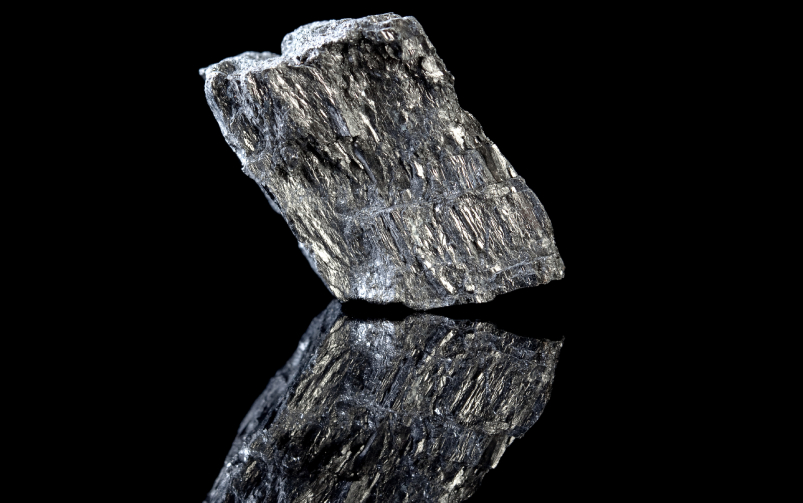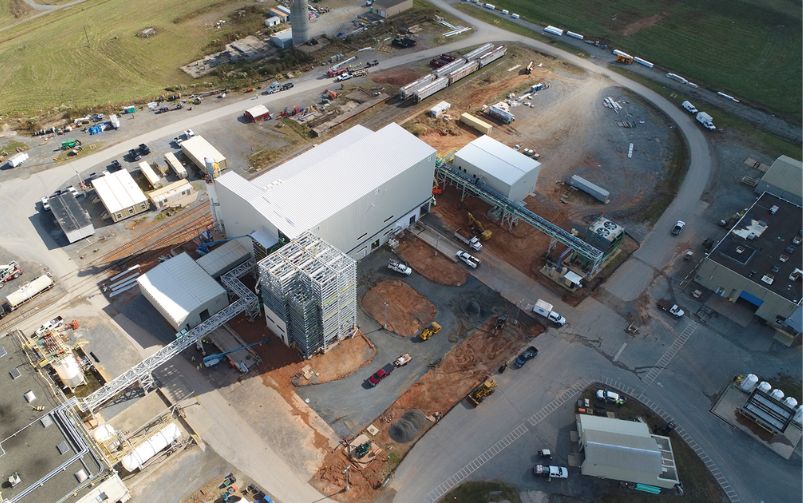Northvolt’s Ett battery gigafactory in Skellefteå, Sweden. The factory runs entirely on clean energy and has been assembling battery cells since late 2021. Courtesy of Northvolt.
Welcome back to your weekly mining news recap, where we catch you up on some of the news you may have missed. This week’s headlines include a Suncor acquisition, a new policy from Tsilhqot’in First Nation and Algoma’s contract extension with U.S. Steel.
Correction: In the September 29 recap we mischaracterized the nature of a B.C. Supreme Court decision. The court did not rule that the province’s permitting system was unconstitutional, but rather that the current mineral claims system does not satisfy the duty to consult with Indigenous groups. We regret the error.
Northvolt announced plans for a multibillion-dollar electric vehicle battery plant 30 kilometres east of Montreal, as reported by the CBC. The first phase investment totals $7 billion and would have a battery cell manufacturing capacity of up to 30 GWh annually, while the second phase is expected to double that output. Alongside promises to match American Inflation Reduction Act subsidies, the federal government and Quebec will invest a total of $2.7 billion to build the factory, and then provide production incentives of up to $4.6 billion afterwards. The plant is expected to be finished by 2026.
Barrick Gold announced a US$2 billion expansion to its Lumwana copper mine in Zambia, as reported by The Canadian Press. The mine produced 267 million pounds of copper in 2022, and the expansion would increase production to 240,000 tonnes of copper annually over a 36-year life-of-mine. Barrick hopes to complete a full feasibility study by the end of 2024 and bring expanded process plant production forward to 2028.
Vital Metals’ subsidiary Vital Metals Canada has filed for bankruptcy, as reported by Mining Weekly. Construction of its Saskatoon rare earths processing facility was halted in April due to a lack of cash, after it was assessed to be economically unviable, and the company could not find a way to repurpose it despite talks with various third parties. The company later attempted to adjust an offtake deal with Norwegian company REEtec and filed for bankruptcy after those talks collapsed. Vital Metals’ other Canadian subsidiary, Cheetah Resources, which mines rare earths in the Northwest Territories, is still continuing operations.
Suncor Energy has agreed to buy the remaining stake of TotalEnergies’ Canadian oil sands operations for $1.47 billion, as reported by Reuters. The deal would give Suncor the remaining 31.23 per cent stake in the Fort Hills oil sands operation in Alberta, bringing its ownership to 100 per cent and adding 61,000 barrels per day of bitumen and 675 million barrels of proven and probable reserves to its portfolio. ConocoPhillips used the right of first refusal to scuttle a planned sale of TotalEnergies’ Canadian assets to Suncor earlier this year.
The Tsilhqot’in First Nation of west-central British Columbia has published a policy regarding mining, oil and gas projects, as reported by Business in Vancouver. The policy outlines prerequisites for exploration and extraction to be considered by the Nation. These include resource revenue, impacts-benefits agreements and ensuring ancestral land is eventually returned to an acceptable state.
Sault Ste. Marie, Ontario steel producer Algoma has extended its contract with U.S. Steel for another two years, as reported by Northern Ontario Business. Algoma is building a new electric arc furnace plant, expected to be done in 2024, as it shifts over from blast furnace steelmaking. With the extension, Algoma will continue sourcing iron from U.S Steel’s Mesabi Range iron mines in Minnesota.
Asset monitoring technology is revolutionizing the way miners mitigate costly downtime, wrote Sarah St-Pierre in the August issue of CIM Magazine. Unplanned downtime is one and a half to three times as costly as planned downtime, and equipment failure can cause health and safety risks. New monitoring systems and software that regularly check components, from major infrastructure like conveyor belts to small machines, help save time and reduce life cycle costs.
In 2025, Vancouver miner West Red Lake Gold Mines plans to restart production for its Madsen mine in Red Lake, Ontario, as reported by Northern Ontario Business. The mine ceased production and was placed in care and maintenance in October 2022, before being bought by West Red Lake in June. West Red Lake plans to begin with 38,000 metres of underground diamond drilling in the first year. The company is also testing Rowan, a second gold deposit it owns northwest of Madsen, with a 35,000 metre drilling program next year.
Solaris Resources Inc. has appointed China International Capital Corp. Ltd. to help sell its Warintza copper project in southeast Ecuador, according to the Financial Post. Analysts are questioning whether or not a sale to a Chinese buyer would run afoul of Canada’s new policies, which increase the difficulty for foreign businesses influenced by “non-like-minded” nations to invest in Canada’s critical minerals sector. Lawyers who deal with the legislation said it gives the government “fairly broad jurisdiction” over companies with assets outside Canada.
Vale Base Metals signed a commercial offtake deal with Brazilian company BluestOne to transform waste from its Onça Puma nickel mine into fertilizer. The deal has BluestOne taking up to 50,000 tonnes of nickel refinery slag annually for 10 years. BluestOne is preparing to build a nearby plant to convert the material and will also work with Vale to explore whether its other base metal operations might offer similar circular economy opportunities.
That’s all for this week. If you’ve got feedback, you can always reach us at editor@cim.org. If you’ve got something to add, why not join the conversation on our Facebook, Twitter, LinkedIn or Instagram pages?




